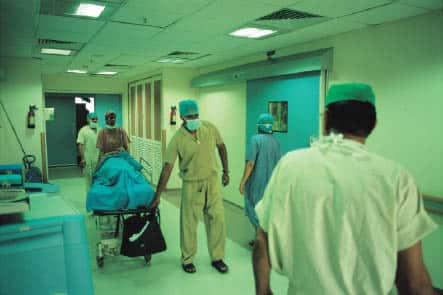Rural Healthcare
For a nation with super power ambitions, India fares abysmally low in almost all indicators pertaining to health care. Next to marriages, health care expenses are the primary cause for debt in rural India.
And thanks to technological innovations, this is also one sector wherein results could be achieved within a short span of time. So if you are a socially conscious individual interested in making a difference double quick, this is the sector to be in.

Know your discipline: Work in the health sector is varied but may be grouped roughly into the following categories: public health, mental health and related issues, administration of hospitals and nursing centres, drug abuse/de-addiction, accidents and trauma, and medical laboratories services.
According to Dr. A Dyalchand, Director, Institute of Health Management, Pune, “Under the National Rural Health Mission, the Government has adopted a policy to appoint district managers with a management degree or professionals with a Master’s in health science or social work degree.”
|
There are both regular and specialised courses that are offered to make a niche in this field (see table). While it is extremely difficult to list exclusive courses in this domain, one can see that the syllabus is usually a judicious mixture of theoretical and practical assignments.
Students gain the much-needed experience, a prerequisite for employment to some organisations, even as they pursue their programme. A lot of emphasis is now being given to courses that are intense, highly specialised and of a shorter duration.
Job prospects: Developments in the health and allied sectors during the last decade have provided enormous opportunities for students to choose a career of their interest in this sector. One can opt for a suitable course to work as doctor, nursing personnel, qualified scientific, technical or therapeutic staff – including clinical psychologist or say a biomedical researcher.
One may also think about alternative therapies, like Ayurveda which has its own niche in India. There are allied health professionals, including occupational therapists and radiographers. Learning disabilities is an integral part of the health sector. Here one deals with a variety of conditions such as autism, cerebral palsy and Down’s syndrome or generally speaking, conditions of physical disability, or mental health or behavioural problems that cause impairment or delay in intellectual progress.
Professor Anand Goud, a faculty at the Indore School of Social Work says, “There is a dearth of skilled personnel to fill in the gap between the doctors and patients in India. For instance a medical psychiatrist-cum-social worker will be equipped to counsel and deal with the patients, emotionally.”
Be Eligible: For general undergraduate courses in medicine and nursing you need to be good in subjects like biology, chemistry, mathematics and English at the higher secondary school level and develop reasoning and logical thinking skills, for entrance examinations.
For specialised courses at the postgraduate level one needs to have a Bachelor’s degree with a certain minimum level of pass percentage.
The essential qualities or attributes that employers look for in professionals of this sector are resilience, empathy, emotional intelligence and warmth.
Social workers require a sound knowledge of the legislation and policies that drive their work. They should be able to communicate with a wide range of people - an essential skill, if any intervention is to be successful.
More than half of the social workers’ time is spent out in the community, visiting affected people and their care providers, assessing new referrals and developing care plans to meet their needs.
Where to Study: Apart from universities, institutions such as the National Institute of Mental Health and Neuro Sciences, Bangalore; College of Social Work, Nirmala Niketan, Mumbai; Welingkar Institute of Management, Mumbai, Ranchi Institute of Neuro-Psychiatry & Allied Sciences and Apollo Institute of Hospital Administration, Hyderabad offer highly specialised courses.
These help prepare professionals a experts and help contribute to the betterment of life for several people.
Entry level salaries: The salary structure for someone in the medical laboratory services would range between Rs. 1.5 to 3 lakhs per annum. It would be a little less for a community health worker in the rural areas. An expert in disability studies or a clinical psychologist would earn anywhere between Rs. 2.5 lakh to 6 lakhs , annually.
Articles
Upcoming Exams
Application Date:15 October,2024 - 25 January,2025
Application Date:11 November,2024 - 08 April,2025
 SANA CONTRACTOR, 26,
SANA CONTRACTOR, 26, 